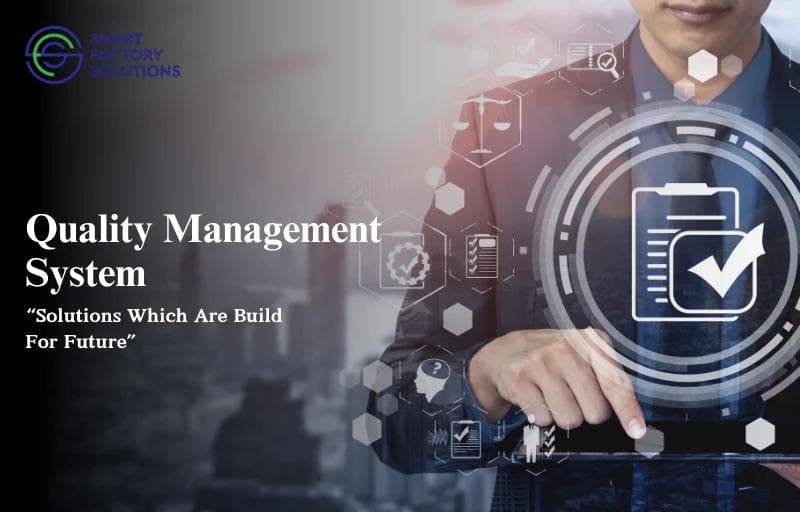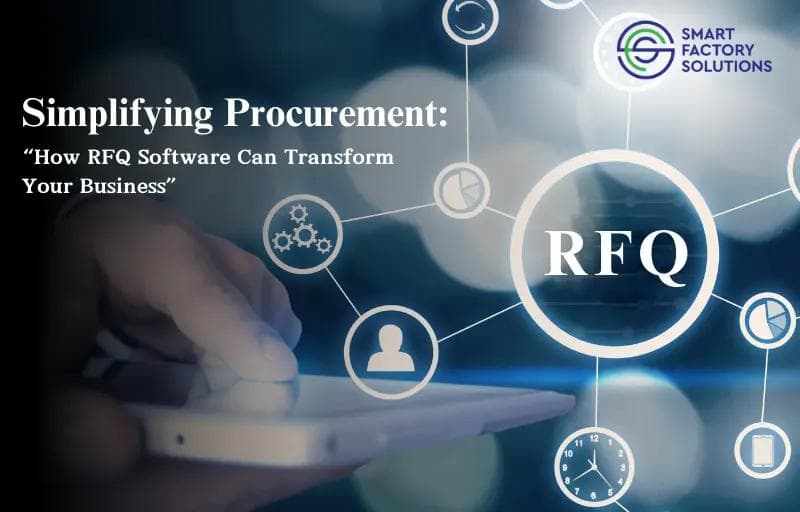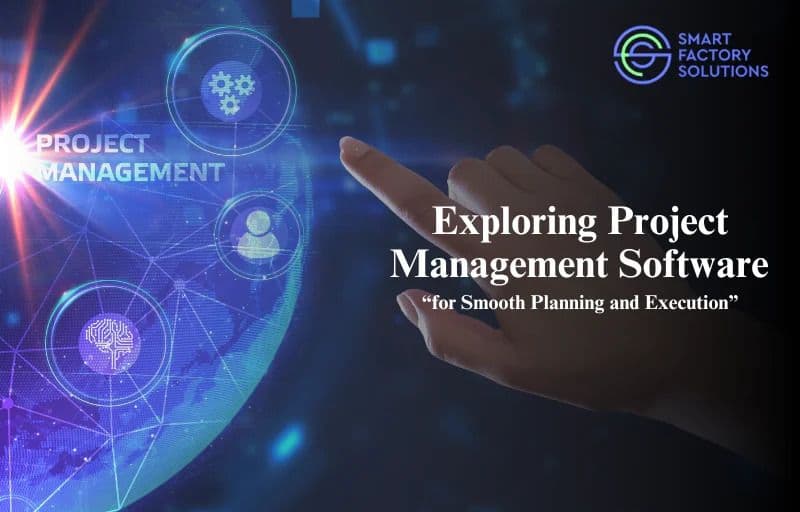Back
Project Management Software for the Manufacturing Industry

Introduction:
Efficient project management is critical to success in the fast-paced and highly competitive manufacturing industry. The complexities of managing manufacturing projects demand a robust and reliable solution, from planning and scheduling to quality control and resource allocation. This is where project management software comes into play. By leveraging the right tools, manufacturers can streamline operations, enhance productivity, and ensure timely delivery of products. In this blog, we will explore the key benefits of project management software for the manufacturing industry, examine the features to look for, and highlight some of the top solutions available today. Whether you're a small manufacturer looking to optimize your processes or a large enterprise seeking to maintain a competitive edge, understanding the power of project management software can transform how you do business.
Features of Project Management Software for the Manufacturing Industry
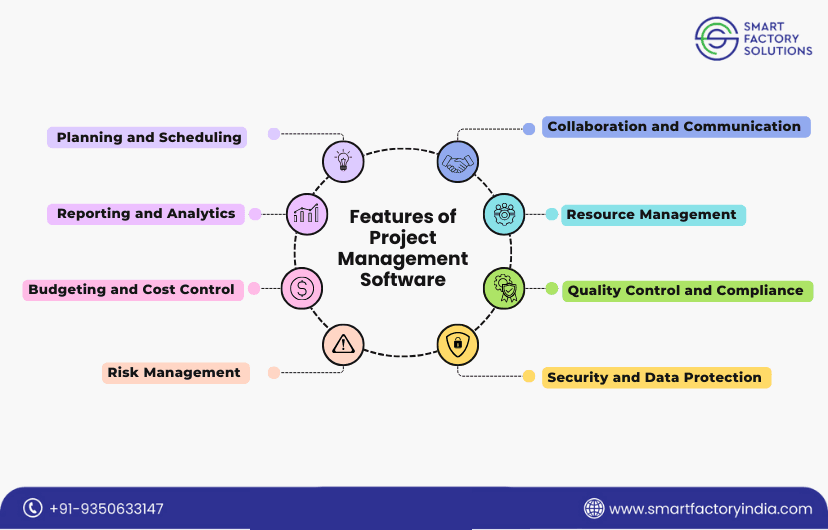
Planning and Scheduling Tools
- Gantt Charts and Timelines: Visualize project timelines and track progress against deadlines.
- Task Management: Break down projects into manageable tasks and assign them to team members.
- Resource Allocation: Allocate resources effectively, ensuring optimal use of workforce and materials.
2. Real-Time Collaboration and Communication
- Centralized Communication Platform:Facilitate communication among team members, stakeholders, and departments.
- Document Sharing and Management: Store and share important documents, blueprints, and specifications in a centralized repository.
- Team Collaboration Tools: Utilize discussion boards, chat features, and collaborative workspaces to enhance teamwork.
3. Advanced Reporting and Analytics
- Customizable Dashboards: Create dashboards that provide real-time insights into project status, performance metrics, and critical indicators.
- Automated Reports: Easily generate reports on project progress, resource utilization, and financials.
- Data Analytics: Analyze project data to identify trends, forecast outcomes, and support decision-making
4. Resource Management
- Inventory Tracking: Monitor and manage inventory levels to ensure materials are available when needed.
- Labour Management: Schedule shifts, track labour hours, and manage workforce productivity.
- Equipment Management: Schedule maintenance and track the utilization and performance of machinery and equipment.
5. Budgeting and Cost Control
- Budget Planning: Set project budgets and allocate funds to different tasks and phases.
- Cost Tracking: Monitor real-time expenses to ensure projects stay within budget.
- Financial Reporting: Generate detailed financial reports to track costs and economic performance.
6. Quality Control and Compliance
- Quality Management: Implement quality control processes and track quality metrics to ensure standards are met.
- Compliance Tracking: Ensure industry regulations and standards adherence through automated compliance tracking.
- Audit Trails: Maintain detailed records of all project activities for auditing and compliance purposes.
7. Risk Management
- Risk Identification: Identify potential risks early in the project lifecycle.
- Risk Assessment: Evaluate the impact and likelihood of identified risks.
- Mitigation Planning: Develop and implement strategies to mitigate or eliminate risks.
8. Security and Data Protection
- Data Encryption: Protect sensitive project data with robust encryption methods.
- Access Controls: Implement role-based access controls to ensure only authorized personnel can access specific information.
- Backup and Recovery: Ensure data is backed up regularly and can be recovered in case of system failures.
By incorporating these features, project management software can significantly enhance manufacturing operations' efficiency, productivity, and competitiveness, ensuring projects are completed on time, within budget, and to the highest quality standards.
Key Benefits of Project Management Software
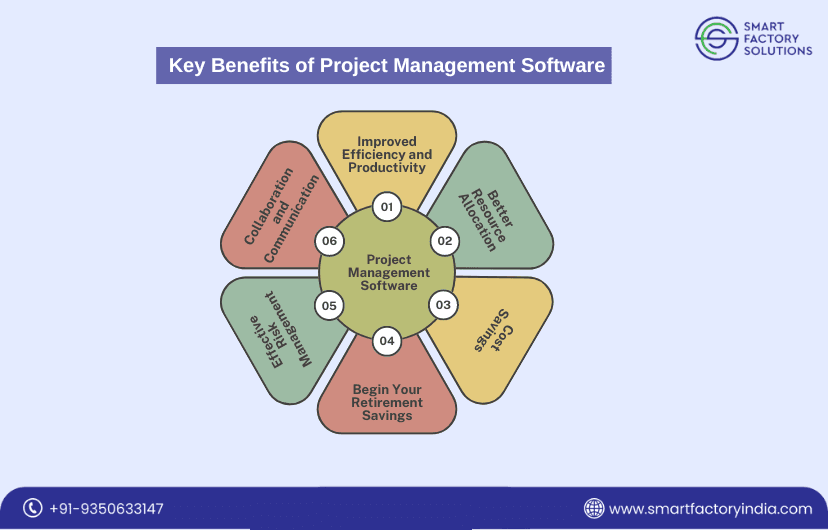
Improved Efficiency and Productivity: Project management software streamlines processes, reduces manual tasks, and automates workflows, increasing efficiency and productivity across manufacturing projects.
Enhanced Collaboration and Communication: Project management software fosters better teamwork and communication among project stakeholders, both internally and externally, by providing centralized communication platforms and collaborative tools.
Better Resource Allocation: With features for resource tracking and allocation, project management software ensures that resources such as labor, materials, and equipment are utilized optimally, minimizing waste and maximizing productivity.
Increased Transparency and Visibility: Project management software offers real-time visibility into project progress, allowing stakeholders to track milestones, monitor performance, and make data-driven decisions, leading to improved transparency and accountability.
Effective Risk Management: Project management software facilitates the identification, assessment, and mitigation of risks through dedicated risk management tools, helping to minimize project disruptions and ensure successful outcomes.
Cost Savings: By optimizing resource utilization, improving efficiency, and reducing the risk of errors and delays, project management software helps manufacturers save costs and achieve better return on investment (ROI) for their projects.
Strategic Planning and Decision-Making: With access to comprehensive project data and analytics, project management software enables manufacturers to make informed decisions, forecast outcomes, and develop strategic plans to drive business growth and competitiveness.
Adaptability to Changing Requirements: Project management software offers flexibility and scalability to adapt to changing project requirements, market conditions, and business needs, ensuring that manufacturing projects remain agile and responsive to evolving challenges.
Customer Satisfaction: Project management software ultimately enhances customer satisfaction by improving project delivery times, ensuring quality products, and providing transparent communication, leading to repeat business and positive referrals.
These key benefits illustrate how project management software can significantly impact manufacturing operations by improving efficiency, collaboration, decision-making, and overall project success.
How to Choose the Right Project Management Software
Choosing the right project management software is crucial for optimizing workflows and ensuring project success. Begin by assessing your specific needs and project requirements. Evaluate software features such as task management, scheduling, collaboration tools, and integration capabilities. Prioritize user-friendliness, scalability, and mobile accessibility for seamless adoption and usage. Security and data protection are paramount, so select a solution with robust security features. Consider the level of customer support and training resources provided by the software provider. Lastly, analyze the cost to ensure it fits within your budget constraints. By considering these factors, you can choose a project management software that best aligns with your organization's goals and needs.
Solution
Smart PM is a Project Management Software Solution designed to streamline your project planning, execution, and monitoring processes. With its user-friendly interface and robust feature set, Smart PM empowers teams to collaborate effectively, track progress efficiently, and achieve project objectives with confidence. From intuitive task management and dynamic scheduling to seamless collaboration and insightful reporting, Smart PM offers everything you need to drive project success. Whether you're managing small projects or large-scale initiatives, Smart PM adapts to your needs, providing scalability, flexibility, and security every step of the way. Say goodbye to project management headaches and hello to Smart PM—the smarter way to manage your projects.

